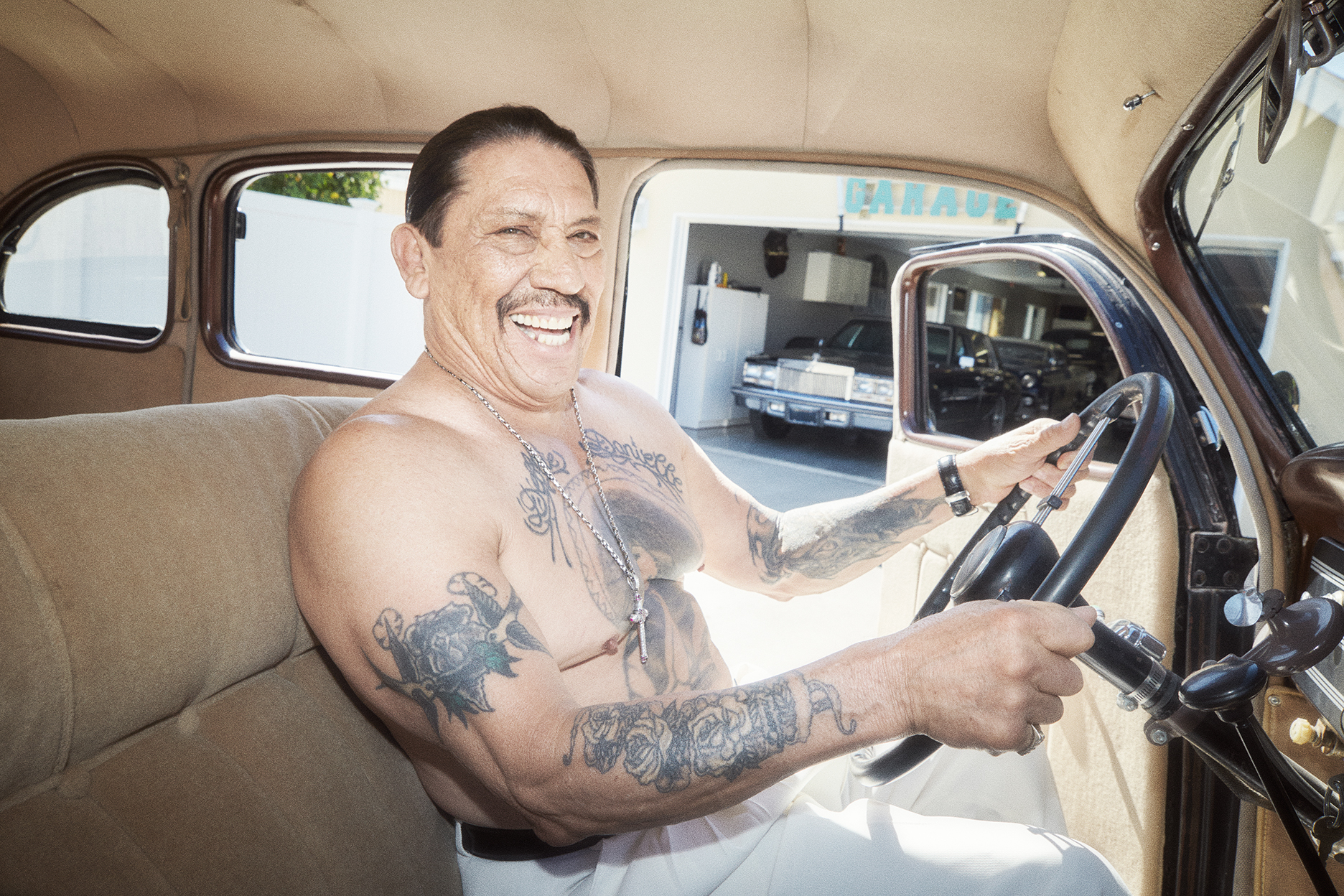Office – So you’re in Austin right now, what are you working on?
Danny Trejo – Right now I’m working on From Dusk Till Dawn, the TV series for El Rey Network with Robert Rodriguez.
O – You work an insanely busy schedule, with tons of projects every year. You’re seventy now, has the thought of retiring every crossed your mind?
DT – Well, I was trying to figure out—when people retire they start doing what they love. I’m already doing what I love, so I don’t know what I’d retire to.
O – That’s a good thing, you’re lucky. Why stop what you’re doing, if you’re just going to be bored?
DT – I’d be bored to death! I mean I can go fishing any time I like, I can do whatever I want, so it’s like—retire to what?
O – People see you on screen and expect a certain character,
a character that comes naturally to you, and that you’ve nailed so many times—what’s a role that’s surprised you, a character that’s made you explore yourself a bit more?
DT – You know, I did a film called Sherrybaby with Maggie Gyllenhaal where I played her love interest, but I was kind of a nice guy, and her friend also. It wasn’t just Johnny-23, you know? I think that was probably the hardest role I’ve ever done, and as an actor it was the most satisfying, and rewarding. But I love Machete better. [laughs]
O – Did movies affect you profoundly as a child? Were there actors or characters that you were looking up to as a kid?
DT – When you talk about Charles Bronson, Clint Eastwood—I liked the superhero guys, but the ones that didn’t have to wear tights, you know what I mean? I like the regular guys that just did what had to be done. You look at Charles Bronson in the Death Wish series, Clint Eastwood in Dirty Harry. Those guys.
O – They don’t need superpowers.
DT – Yeah, they find a way. Like MacGyver, you know? He’ll find a way to blow it up.
O – So even as a kid you admired those characters?
DT – Oh yeah.
O – You’ve talked about your uncle, who was a criminal, and how he got you into that lifestyle early on, and it kind of makes sense that you were attracted to it, since there is some overlap between those guys and your uncle, in terms of badassness, being able to wield a gun, and not get fazed by anything.
DT – Yeah, my uncle was a pretty tough guy, people got out of his way. That was cool. But any time drugs are involved in a situation, it’s bad. One of my key things when I’m speaking at high schools is, “It’s really simple. Drugs and alcohol will make any problem that you have worse.”
O – But you didn’t have this wisdom then—were your parents not aware of you getting involved with the drugs and crime?
DT – Well I don’t think they were available. I think one of the things I learned from my parents was how not to be. They were loving, but you’ve got to remember I grew up in a different era, when the most important thing in the world was to work. It seemed like my dad’s dream was for me to graduate from high school and come do construction with him, manly kind of stuff. College wasn’t even thought of, where I came from. College, what the hell? The mindset was kind of, if you don’t want to work you go to college. We had like two alternatives, you could be a drug dealer or a laborer.
That’s all I can remember. I didn’t know any lawyers, I didn’t know any doctors or businessmen growing up. I just knew guys that worked hard, or guys that dealt drugs.
O – There’s not exactly an inspiring amount of glory in either one, but I can see how the crime at least has some degree of excitement to it, especially when you’re young. So how did the crime escalate? If you started with your uncle really early, how did it get to the point where you were doing time?
DT – I first got into drugs, I started smoking weed with my uncle when I was eight years old. It was...1954? But you’ve got to remember, in every Mexican neighborhood weed grew everywhere. Anywhere there was sun and a dripping faucet, you’d throw your seeds and three weeks later you’d have a plant. It wasn’t hydroponic, growing this kind, growing that kind—but we always had four or five plants going somewhere. My uncle turned me on to grass, it was just part of the deal. Everybody around us smoked weed. The law didn’t reach us there. I would walk around the neighborhood, eleven years old, smoking weed. I knew to hide it from the police, you knew it was illegal but you didn’t know the price.
